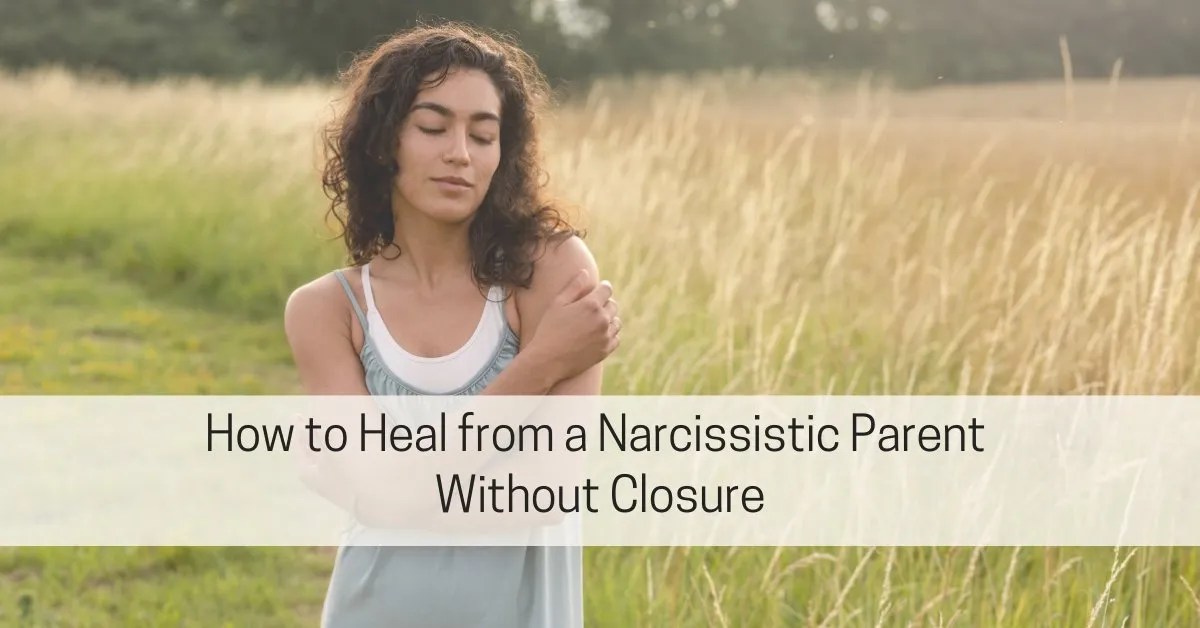Letting go without closure from a narcissistic parent can feel overwhelming, especially when you’re waiting for an apology or acknowledgment that may never come. Narcissistic parents often prioritize their own needs over yours, using manipulation, emotional neglect, and control tactics to maintain their position. They typically lack empathy, avoid responsibility, and remain unwilling to recognize the harm they’ve caused.
The hardest part can be seeking closure: a final conversation where everything makes sense, an apology for the harm they cause, or an acknowledgement of your pain. But what happens when closure never happens? How do we heal without the answers we desperately want?
Learning to let go of a narcissistic parent without closure can be challenging, but it’s also empowering and healing.
This post contains an affiliate link, which means we may earn a small commission if you make a purchase through our links. There is no added cost for you.
Why We Crave Closure from Those Who Hurt Us
It’s natural to seek closure when a relationship ends or becomes conflicted. We crave a sense of finality, something that will make sense of our emotional pain and bring us peace. Often, we hope for an apology, an acknowledgment of the harm caused, or even just an explanation for why things unfolded the way they did. We want to hear the words “I was wrong,” or perhaps to understand why we were treated the way we were. The problem is that narcissistic or toxic parents usually lack the emotional awareness, empathy, or willingness to give us the closure we need.
The desire for closure is especially strong when it comes to our parents. Even as adults, the need for our parent’s love, validation, and understanding is deeply ingrained. It’s normal to want to feel accepted by those who are supposed to care for us. When that validation is absent, or worse, toxic, we’re left with confusion, hurt, and a constant longing for answers.
The lack of closure can feel like an emotional wound that never heals, making it hard to let go of the hope that one day our parent will offer what we’ve been waiting for. But the truth is, closure rarely comes from those who’ve hurt us, and learning to heal without it is crucial for reclaiming our peace.
The Process of Letting Go Without Closure from a Narcissistic Parent
Letting go without closure means releasing the expectation that your narcissistic parent will provide the answers or acknowledgment you’ve been waiting for. This process requires recognizing that your healing doesn’t depend on their participation or permission.
This might involve setting firm boundaries, creating emotional distance, or ending contact entirely. Each person’s path looks different, but the core principle remains the same: you stop waiting for someone else to validate your experience and begin honoring it yourself.
The shift happens when you realize that waiting for their acknowledgment has kept you stuck in a cycle of powerlessness and disappointment. You can achieve closure without your narcissistic parent.
Making the Decision to Limit or End Contact
One of the most challenging yet liberating steps is deciding to limit or cut contact with a narcissistic parent. You might feel guilty, like you’re doing something terrible or abandoning your responsibilities as their child.
In reality, creating distance from a narcissistic parent is self-protective. Distance can allow you to finally focus on your own needs without the toxic dynamics that kept you trapped in old patterns. Yes, it’s painful. Yes, there will be moments of doubt. But choosing your mental and emotional health over a harmful relationship is an act of self-compassion.
Working Through the Guilt of Going No Contact or Low Contact
Guilt almost always accompanies the decision to distance yourself from a parent. You might hear internal voices saying, “good children don’t abandon their parents,” or feel pressure to reconcile from family members who don’t understand your choice.
Remember this: you are allowed to protect yourself from harm, even when that harm comes from a parent. Your parent’s inability to see or acknowledge your pain doesn’t reflect your worth or value as a person.
When guilt surfaces, examine what staying in the relationship actually costs you. What did you sacrifice—your peace, your self-worth, mental health, other relationships—to maintain a connection with someone who consistently harmed you?
Practice self-compassion during these moments. You’re primary job is to love and protect yourself. You are not responsible for your parents’ emotions or well-being.
Grieving the Parent You Never Had
An essential part of healing involves grieving not just the relationship you’re leaving behind, but the loving relationship you longed for. This means mourning the nurturing, supportive, emotionally available parent you needed and deserved.
This grief work is hard. You may find yourself revisiting childhood memories, feeling angry about what you missed, or experiencing profound sadness about the love that was never offered. Allow yourself to feel these emotions fully without judgment.
Grieving is about accepting and processing reality so you can move forward. Some helpful approaches include writing letters you’ll never send, creating rituals to honor your losses, or working with a therapist who understands family trauma.
Creating Your Own Closure
When your parent refuses to take responsibility for their actions, you must create closure for yourself. This involves accepting your experience as valid without needing their acknowledgement.
One way to foster closure is by practicing self-validation. You are the expert on your own experience, and you can honor and validate your feelings, even without your parent’s acknowledgment. This type of self-compassion is a critical part of the healing process.
Here are some self-validating phrases and affirmations that can help you release the need for closure:
- “I don’t need an apology to know that I deserve to be treated with respect.”
- “Healing doesn’t require closure from anyone else—it begins with me.”
- “I can accept that I may never get the answers I’m seeking.”
- “I don’t need my parent’s validation to know that my experience is valid.”
- “Letting go of the need for closure is an empowering step toward my own healing.”
Journaling can also be a powerful way to process your emotions and track your progress. Write about your experiences, the boundaries you’ve set, and the growth you’re experiencing as you distance yourself from toxicity. Or use a guided journal, such as Finding Peace Without Closure.
Moving Forward without Closure
Letting go without closure is about choosing healing, freedom, and peace over the false hope of getting what you need from someone who cannot provide it.
This process takes time, and healing doesn’t follow a linear path. Some days will be harder than others. But as you move forward, trust that peace comes from within, not from someone else’s acknowledgment of your pain.
You have the power to reclaim your emotional well-being and build a life rooted in your own values and needs. The greatest gift you can give yourself is the freedom that comes from no longer waiting for someone else to grant you permission to heal.
©2025 Dr. Sharon Martin, LCSW. All rights reserved. Photos courtesy of Canva.com.









